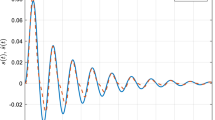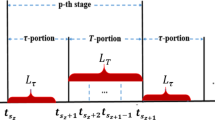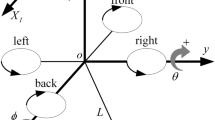Abstract
In this paper we consider the control problem for a class of partially observed bilinear stochastic systems with fuzzy parameters. Using Takagi–Sugeno fuzzy model, the problem is described by three sets of fuzzy stochastic differential equations: one for the state process, one for the observed process and one for the controller which is assumed to be driven by the observed process. With this formulation, the original stochastic control problem can be treated as a deterministic identification problem in which the controller parameters and the corresponding membership functions are the unknowns. Using a suitable performance index, we have developed a set of necessary conditions for determining the parameters of the controller and the corresponding membership functions. Finally, some numerical simulations are presented to illustrate the effectiveness of the proposed fuzzy control scheme.
Similar content being viewed by others
References
Ahmed, N. U., Elements of Finite Dimensional Systems and Control Theory, Longman Sci. Tech.: New York, 1988.
Ahmed, N. U., Optimization, Identification and Control of Systems Governed by Evolution Equations on Banach Space, Pitman Research Notes in Mathematics Series, Vol. 184, Longman Sci. Tech.: New York, 1988.
Ahmed, N. U., “Computer aided design of optimal feedback controls for partially observed systems driven by martingale processes, ” in 14th IFIP on System Modeling and Optimization, Leipzig, July 1989.
Ahmed, N. U., “Identification of operators in systems governed by evolution equations on Banach space, ” in Breudez (ed.), Control of Partial Differential Equations, Lecture Notes in Control and Information Science Vol. 114, pp. 73–83, 1989.
Äström, L. and Wittenmark, B., Computer Controlled Systems: Theory and Design, 2nd ed., Prentice-Hall: Englewood Cliffs, NJ, 1990.
Äström, L. and Wittenmark, B., “On self-tuning regulators, ” Automatica, Vol. 9, pp. 185–199, 1973.
Becker, A., Kumar, P. and Wei, C., “Adaptive control with the stochastic approximation algorithm: Geometry and convergence, ” IEEE Trans. Automat. Control, Vol. 30, pp. 330–338, 1985.
Chen, G., Tseng, C. and Uang, H., “Robustness design of nonlinear dynamic systems via fuzzy linear control, ” IEEE Trans. Fuzzy Systems, Vol. 7, No. 5, pp. 571–585, 1999.
Chen, G., Wang, J. and Sheih, L., “Fuzzy Kalman filtering, ” J. Inform. Sci., Vol. 109, pp. 197–209, 1998.
Dabbous, T. E., “Optimal control for a class of partially observed bilinear stochastic systems, ” in 29th IEEE Conf. on Decision and Control, Hawaii, pp. 1416–1417, 1990.
Dabbous, T. E. and Ahmed, N. U., “Parameter identification for partially observed diffusions, ” J. Opt. Theory Appl., Vol. 75, No. 1, pp. 33–49, 1992.
Goodwin, G. and Sin, K., Adaptive Filtering, Prediction, and Control, Prentice-Hall: Englewood Cliffs, NJ, 1984.
Goodwin, G., Sin, K. and Saluja, K., “Stochastic adaptive control and prediction, the general delay-colored noise case, ” IEEE Trans. Automat. Control, Vol. 25, pp. 946–949, 1980.
Kumar, P., “A survey of some results in stochastic adaptive control, ” SIAM J. Control Optim., Vol. 23, pp. 329–380, 1985.
Kumar, P. and Becker, A., “A new family of optimal adaptive controllers for Markov chains, ” IEEE Trans. Automat. Control, Vol. 27, pp. 137–146, 1982.
Kumar, P. and Praly, L., “Self-tuning tractors, ” SIAM J. Control Optim., Vol. 25, pp. 1053–1071, 1987.
Kumar, P. and Varaiya, P., Stochastic Systems: Estimation, Identification and Adaptive Control, Prentice-Hall: Englewood Cliffs, NJ, 1984.
Ren, W. and Kumar, P., “Stochastic adaptive prediction and model reference control, ” IEEE Trans. Automat. Control, Vol. 39, No. 10, pp. 2047–2060, 1994.
Schuppen, V., “Tuning of Gaussian stochastic control systems, ” IEEE Trans. Automat. Control, Vol. 39, No. 11, pp. 2178–2190, 1994.
Sin, K., Goodwin, G. and Bitmead, R., “An adaptive D-step ahead predictor based on least squares, ” IEEE Trans. Automat. Control, Vol. 25, pp. 1161–1164, 1980.
Teo, K. L. and Wu, Z. S., Computational Methods for Optimizing Distributed Systems, Appendix V, Academic Press: New York, 1984.
Wang, L., Adaptive Fuzzy Systems and Control, Prentice-Hall: Englewood Cliffs, NJ, 1994.
Author information
Authors and Affiliations
Rights and permissions
About this article
Cite this article
Dabbous, T.E. Fuzzy Optimal Control for Bilinear Stochastic Systems with Fuzzy Parameters. Dynamics and Control 11, 243–259 (2001). https://doi.org/10.1023/A:1015224002970
Issue Date:
DOI: https://doi.org/10.1023/A:1015224002970




